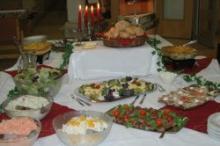
The time between Ash Wednesday and Easter is call time of fasting. Where does this come from?
For thousands of years already, mankind has known the word "to fast". In the various cultures people fast at certain times. Yet this has got nothing to do with the idea of keeping the body in nice shape. It also has got nothing to do with the fact that some consider themselves too fat and want to reduce weight.
The original idea of fasting is another.
What is the original idea of fasting?
All humans are created in a way that they have to breathe and have to eat and drink in order to survive. Breathing normally happens without our assistance; that means we do not have to think of breathing, we do it automatically.
With eating and drinking it is different. We have the free choice to eat and drink what we want to and how much we want to. We have nerves that provide us with taste, and each of us may decide individually what he or she wants to eat, what he considers as specially tasty or not. Depending on our financial possibilities and also depending on what is available in the area where we live, we have a wide variety of food and drinks.
The original idea is that our bodies have to function. Only by providing them with enough nutrition, vitamins and others will they be able to work properly. In case certain things lack in our nutrition certain diseases will come up in our bodies.
Yet our creator decided that eating and drinking should be more than just maintaining our bodies and making them function nicely. We may feel joy in eating. Food may taste deliciously.
A wide variety of cultures has developed with many different styles of eating. We are being offered numerous kinds of food, so that all kinds of tastes may be satisfied.
Yet what about fasting?
Once my body used all the nutrition that it received, I feel hungry. I have the natural desire to eat again. This has got nothing to do with lust. When I smell some especially tasty food or when I see some beautifully decorated food I may have the desire to eat although I am not at all hungry. My body is still satisfied but nevertheless I feel that I want to eat this.
We may follow these desires or we resist them. There is nothing evil in following them as long as I don’t do any harm to my body. So it is a question of intensity.
Yet it may also become a basic question of my personal attitude to life itself. What is this like. Do I mainly live in order to meet my desires? Am I trying to follow these desires without caring whether they do me good or not? Or do I with every step take into consideration whether this is good for me or not or whether this is necessary or not or whether I am meant to do this or not?
I think there are numerous reasons why we act in this or that way. It would be worth reflection upon this.
When my sole idea of eating is to meet my momentary desires, all my thoughts are strongly fixed on these desires. For sure you have already experienced that you ate such a lot that afterwards you were tired, unable to move or to ponder upon any serious thoughts.
Fasting means that on purpose I resist certain physical joys (like eating) for a restricted period of time. When I do not eat and thus feel hungry, I shall become aware that life is more than eating and drinking. This shall remind me that I cannot live on my own. My body depends on food, yet also my spirit depends on receiving nutrition. I have to regularly feed my body in order not to starve.
Yet my soul, too, should not starve. I have the natural desire to be acknowledged, to be honoured, to be loved. This food for our souls we may receive through human relationships. Yet we also receive it by turning towards, God our Creator,
So the idea of fasting is to let the body starve for a certain period of time in order to provide the soul with an extra amount of nutrition at the same time.
The main nutrition for the soul is love. Jesus suffered for mankind, and died for our sins because he loves us so very much. During the weeks before Easter we should especially think of this time of suffering and of the death of Jesus. That is why we have this time of fasting.
Have you ever counted these 40 days from Ash Wednesday until Easter? Don’t worry, there is no mathematical error. You have to omit the Sundays, then you will have precisely 40 days from Ash Wednesday until Saturday before Easter including.
Sunday are no days of fasting. On Sunday we think of the resurrection of Jesus. There we want to be so happy about this that we also want our bodies to participate in this joy by providing especially delicious food for them.
